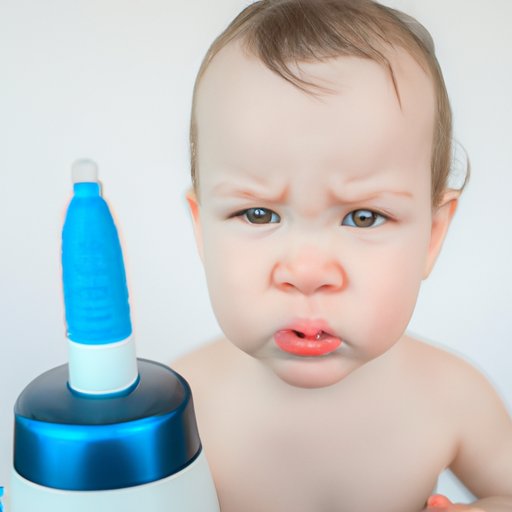Introduction
Baby acne is a common skin condition that affects newborns and infants. It is characterized by red bumps or blemishes on the face, typically on the cheeks, chin, and forehead. These bumps can be irritating and uncomfortable for babies, but they are usually harmless and will go away on their own within a few weeks. In this article, we will explore the causes of baby acne and provide a comprehensive guide on how to clear it up.

Research the Causes of Baby Acne and Identify Triggers
Baby acne is believed to be caused by hormones that are passed from the mother to the baby during pregnancy. These hormones can cause the baby’s oil glands to become overactive, leading to clogged pores and the development of acne. In addition to hormones, there are other potential triggers that can worsen baby acne, such as certain skin care products, changes in temperature, and even stress.
Parents can take steps to identify potential triggers of baby acne. Keeping a diary of when the baby’s acne flares up can help parents pinpoint any potential triggers. Paying attention to the types of products used on the baby’s skin, the environment the baby is in, and any changes in temperature can also help parents determine what may be causing the baby’s acne.
Wash Baby’s Face Gently with a Mild Cleanser
It is important to keep baby’s face clean if they have acne. A mild cleanser should be used to gently wash baby’s face twice a day. Avoid using harsh soaps or cleansers that contain alcohol, as these can irritate the skin and make the acne worse. Make sure to use lukewarm water, as hot water can also irritate the skin. After washing, pat the skin dry rather than rubbing it.
In addition to washing the face, parents should also avoid scrubbing the baby’s skin too hard. This can cause further irritation and make the acne worse. It is also important to avoid using any rough washcloths or sponges, as these can be too abrasive for the delicate skin of a baby.
Avoid Certain Skin Care Products on Baby’s Skin
Some skin care products can make baby acne worse. It is important to avoid using lotions, creams, or gels that contain fragrances, dyes, or other additives. These can clog the pores and irritate the skin. Instead, opt for products that are labeled as hypoallergenic, fragrance free, and non-comedogenic (or non-acnegenic).
It is also important to avoid using any kind of makeup or sunscreen on baby’s skin. These products can clog the pores and make the acne worse. If parents want to protect their baby from the sun, they should opt for protective clothing such as hats and long sleeves instead.
Use a Natural Remedy to Treat Baby Acne
Natural remedies can be used to treat baby acne. Some of the most popular natural remedies include chamomile tea, aloe vera gel, honey, and apple cider vinegar. These remedies can be applied directly to the affected area, but it is important to test the remedy on a small patch of skin first to make sure the baby does not have an allergic reaction.
When using a natural remedy, it is important to follow the instructions carefully. Depending on the remedy, the dosage and frequency of application may vary. For example, chamomile tea can be used daily as a rinse, while aloe vera gel can be applied several times a week.
Use a Humidifier in Baby’s Room
Using a humidifier in baby’s room can help to reduce the symptoms of baby acne. A cool mist humidifier can help keep the air moist, which can help to reduce inflammation and irritation of the skin. It is important to use a cool mist humidifier, as warm mist humidifiers can increase the temperature of the room, which can make baby acne worse.
It is also important to regularly clean and maintain the humidifier to prevent bacteria and mold from growing inside. Refer to the manufacturer’s instructions for proper cleaning and maintenance.
Keep Baby’s Skin Clean and Dry
Keeping baby’s skin clean and dry is key to preventing and treating baby acne. Parents should change the baby’s clothes and bedding frequently to keep them clean and dry. Diapers should be changed as soon as possible after they become wet or soiled. Babies should also be kept away from sources of heat, such as heating pads or electric blankets, as this can make baby acne worse.
It is also important to avoid overdressing the baby. Too much clothing can trap moisture against the skin and make baby acne worse. Loose-fitting cotton clothing is best.

Consult a Dermatologist for Severe Cases of Baby Acne
If baby acne does not improve after trying the above treatments, it is important to consult a dermatologist. A dermatologist can assess the severity of the acne and provide specialized treatments to help clear it up. For example, they may prescribe topical medications or antibiotics to treat the acne.
It is important to note that some cases of baby acne can last for several months. In these cases, it is best to consult a doctor to ensure that the acne is not caused by another underlying condition.
Conclusion
Baby acne is a common skin condition that affects newborns and infants. While it is usually harmless and will go away on its own, there are steps parents can take to clear it up. Washing baby’s face gently with a mild cleanser, avoiding certain skin care products, using natural remedies, using a humidifier in baby’s room, keeping baby’s skin clean and dry, and consulting a dermatologist for severe cases are all steps that can be taken to help clear up baby acne.


